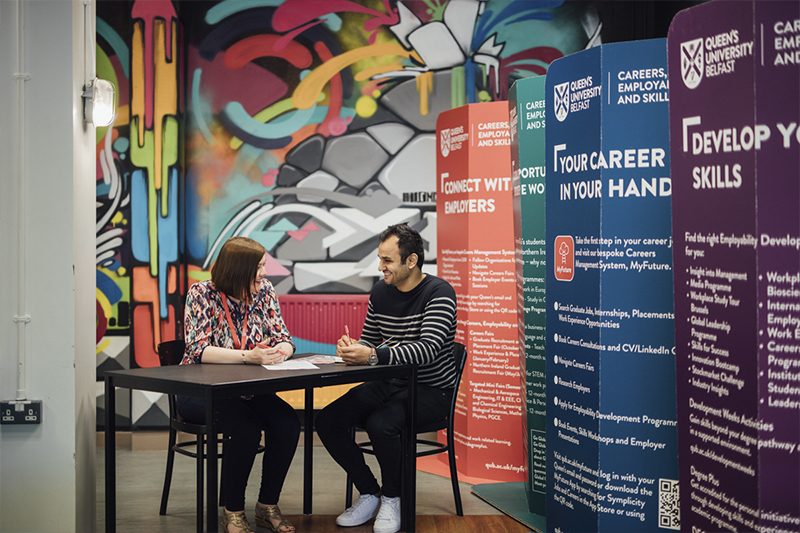At our recent Graduate Recruitment and Placement Fair, we hosted over 130 top employers from all industries and sectors. We took the opportunity to grill them for their best career advice, so you can learn from leaders at the top of their game. Prepare to be inspired…
Use Queen’s Careers Service
“I would advise students to engage with the University Careers Service. Guidance from careers advisors in making applications, developing your CV and identifying future career paths is invaluable. The University Careers Service works closely with employers such as Almac, they know what we are looking for and can really provide added value through employability training and support. Programmes such as Queen’s Degree Plus Award provide students with a great opportunity to develop and hone the key skills needed to succeed within the workplace.”
Kim McAllister, Talent Acquisition Manager, Almac Group
Keep an open mind
“If I was to go back in time, when I was starting my career, the key thing I would say is to keep an open mind. Back when I was finishing my undergraduate degree, I had a very specific idea of what I wanted to do but I ended up going down a route I wouldn’t have imagined in terms of working in recruitment and HR. I studied drama and English initially and the field of work I am in now is really focussed on people. I actually draw on a lot of the stud I learned in terms of communication styles and people from my undergraduate degree into my current role. So yeah, keep an open mind when you are finishing your degree about what it is you want to do. Be patient. Sometimes it can take a while to find the right kind of fit for you when you are graduating. Even in your first year or two of a graduate role you want to get everything right from the first go. It is okay to make mistakes along the way so be patient with yourself.”
Adrian McCarthy is the manager of For Purpose
Back yourself
“Always take the opportunities, don’t doubt yourself. You don’t know where they will lead and what you will learn along the way.”
Joelene Ridgill, Purchasing Manager at Seacoya Group Ltd
Build up your work-related experience
“I’d say, try to get as much experience as possible whether it be through part time jobs, internships or volunteering. For example, working in a shop or restaurant…if you can handle angry customers, you can handle anything!
“Also remember that it’s not just about having the grades. Yes, they are important, but transferrable skills such as proficiency in Microsoft packages, time management, first aid training or experience in organising events, to name a few, are also important. A wellrounded individual who can adapt to different environments and maybe bring something new to the table is very appealing to employers.”
Robbie Barr, Partner, Muldoon & Co
Engage with employers
“Go to as many events run by employers as possible. They really give you an idea of the culture of the workplace and a feel for the people that work there. Liberty IT have a Tech Carnival event which we make as reflective of our culture as possible, it’s pretty casual, has a focus on our people’s passion for technology and is full of employees that are happy to tell you anything you want to know about working for LIT.”
Birgitta Swanberg, Senior Talent Acquisition Specialist, Liberty IT
Have a career plan
“Know what your end goal is and plan your next move from there. Know what you need to do now to get where you need to go. Look for opportunities, even if you take small steps, those steps might take you closer to your end goal, whatever they may be. Be patient but don’t settle. Do your research and make a plan. This will help you when you want to apply for promotion or career advancement.”
Clodagh Mckeefry, Corporate Recruiter, MRP
Try new things
“Try new things and put yourself out there. You could end up in the best position by taking a chance and trying something new. Sometimes it is good to fall outside of the box and not to limit yourself to obvious career choices. Skills are interchangeable.”
Jared Kearney, Senior Campus Recruiter, Citi UK and Citi Ireland







